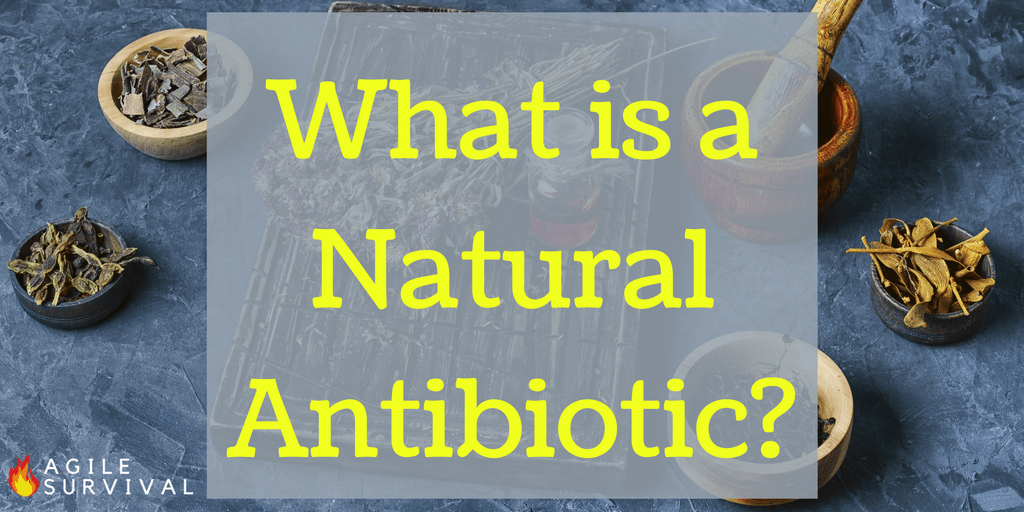
Someday you may not have access to antibiotics. Maybe a doctor isn't available. Maybe there is a drug shortage.
Whatever the situation, you need antibiotics to fight infections. But, how do you find antibiotics when prescription drugs aren't available? Are all natural antibiotics an option?
The answer is yes! Natural antibiotics exist and they are easy to find.
Before we get into the natural options, lets talk about what antibiotics are and what they do.
What Do Antibiotics Do?
Antibiotics are medicines that treat bacterial infections or diseases. They seek out and destroy bacteria, or block bacteria from repairing itself.
Different types of antibiotics target bacteria in different ways.
A word of caution: Antibiotics have an unfortunate side effect - they don't discriminate. They will attack the good bacteria inside you the same way they attack the bad bacteria. Which can leave you susceptible to more health issues down the road.
Here is a great explanation of what antibiotics do:
Antibiotic Resistance
Antibiotics have been saving lives and healing infections for almost 80 years. Unfortunately, bacteria is an ever evolving organism. It can adapt to avoid the effects of antibiotics.
In the United States alone, 23,000 people die from infections that can't be treated due to resistance (source). Here is a video on what causes antibiotic resistance.
Allergies to Antibiotics
A 10 year analysis of deaths in the US, points to drug related anaphylaxis as the leading cause of death. Antibiotics make up more than half of those deaths. 1 in 3 deaths are directly attributed to antibiotics (source).
What Are Natural Antibiotics?
When we think of antibiotics, we imagine drugs prescribed by doctors. But, they can come from nature as well.
People have taken natural antibiotics for centuries. They didn't know why the worked back then. At least not at the scientific level we do now. But, they did work.
Where To Find Natural Antibiotics
You may have several natural antibiotics in your kitchen already. Some you may even consume every day. Others, you may want to add to your pantry.
Quite a few natural antibiotics can be eaten raw. Others will benefit you more when added to teas, tinctures, extracts, as essential oils. Or, put into capsules.
Here is a list of natural antibiotics and how they are best consumed:
- Garlic - Crush and swallow. Crush and put into a capsule. Crush, steep and pour into your ear for an ear infection, or just chew it up and swallow.
- Sauerkraut or Fermented Cabbage - Eat this everyday, if you'd like. It fights bacterial infections and can even heal ulcers.
- Colloidal Silver - Take this internally or apply it topically. Do not take internally for an extended period of time because it can harm good bacteria after a while.
- Horseradish - This is one of the best antibiotic foods known to man. Eat it in it's natural state, form it into a tincture or powder and put into capsules.
- Oregano Oil - Mix up to 8 drops of the oil with water and drink up to 3 times daily.
- Echinacea - This is at the top of the list for natural antibiotics. It is best used in a tincture and you should not use it for more than 2 weeks.
- Ginger - This root is more effective than antibiotics in treating Staph Infections. It can be ingested as it is, added to juice or recipes or add the powdered form to your drink or in a capsule.
- Oregon Grape - Versatile in ways of ingestion, Oregon grape can be taken as a capsule, tablet, tincture or just brewed into a tea.
- Turmeric - This has benefits far exceeding the fight against bacteria and can be used or consumed in almost any fashion.
- Manuka Honey - Use topically 3 times a day on minor scrapes, cuts and burns or eat 1-2 teaspoons a half hour before meals.
- Goldenseal - This is one of the most powerful natural antibiotic options and is best used as an oil, a powder or in a capsule. Do not use it internally for longer than 2 weeks.
- Coconut Oil - We all have heard about the benefits of coconut oil but did you know it kills harmful bacteria, viruses and fungi? Use it topically or eat up to 3 tablespoons a day without heating it up.
- Myrrh - Internally ingest an extract or use as a wash or gargle externally. Only use this during the acute phase of the illness as it is not intended for prolonged use.
Natural Antibiotics For Pets and Livestock

That's right. Your animals might also need to fight an infection some day. The same bad reactions that happen to humans can happen to them.
Many of the same natural remedies humans use may also be used in your pets and/or livestock.
Remember to introduce natural antibiotics slowly. That way you can keep an eye out for any adverse reactions. If possible, seek the advice of a veterinarian before you begin treatment on your own.
Which Is The Best Antibiotic?
Unfortunately, no answer to this question would apply to everyone. Each individual person or animals system works differently. You will have to try them to find out which one works best for you.
From an infected wound or tooth, to sinus infections and UTIs, natural remedies have been used for centuries. Finally, modern medicine is "catching up" to these age old traditions.
Check your local market for these special healing agents. Stock up on the more potent antibiotics, like oil of oregano and colloidal silver. They may be essential in your arsenal against deadly infections.
Disclaimer: We are not doctors. Please consult one before changing your diet, or stopping any medically prescribed treatment.
- What is an Antibiotic? - http://learn.genetics.utah.edu/content/microbiome/antibiotics/
- Antibiotic/Antimicrobial Resistance - https://www.cdc.gov/drugresistance/
- Antibiotics: Misuse Puts You and Others at Risk - http://www.mayoclinic.org/healthy-lifestyle/consumer-health/in-depth/antibiotics/art-20045720
- *Medications are the Main Culprit - http://www.einstein.yu.edu/news/releases/1043/comprehensive-study-of-allergic-deaths-in-u-s--finds-medications-are-main-culprit/
- Colloidal Silver - http://www.webmd.com/vitamins-supplements/ingredientmono-779-colloidal%20silver.aspx?activeingredientid=779
- Natural Antibiotics for Dogs - https://www.cdc.gov/drugresistance/threat-report-2013/
